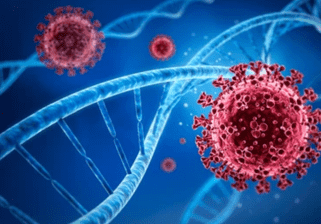
Without previous understanding of organisms, next-generation sequencing (NGS) offers an efficient unbiased approach to determine new coronavirus strains and other pathogens. New variants of the SARS-CoV-2 coronavirus are increasingly concerned about the rapid spread, highlighting the necessity for more sequencing to rapidly identify mutations and limit the risk of new strains. Sequencing was employed early in the epidemic to define the novel coronavirus that caused COVID-19. NGS remains to offer crucial evidence to public health officials, vaccine and drug developers, and researchers, enabling labs to: (1) monitor the virus’ transmission destinations globally, (2) easily identify mutations to limit the occurrence of new types of strains, (3) define viral mutations that, by defined molecular diagnostic assays, can prevent detection, (4) classify viral mutations that can influence the potency of vaccines, (5) screen targets for probable therapeutics for COVID-19, and (6) isolate and classify breathing co-infections and alleles of antimicrobial resistance.
Shotgun Metagenomics
Shotgun metagenomics is a technique of sequencing which analyzes all organisms found in a particular complex sample concisely. It involves the identification without the problem of highly mutagenic areas of viral pathogens that can be troublesome for amplicon-based assays such as qPCR. NGS offers a thorough perspective of the viral genome in addition to solely identifying viral particles, allowing useful insights into viral features and biology. The capacity to have near full viral genome sequence data allows efficient viral surveillance techniques to be implemented to avoid further transmission and infection.
All organisms in a given specimen are sequenced extensively and novel pathogens such as coronaviruses are identified. This NGS technique can help speed up investigations into outbreaks and assist the development of new laboratory tests.
Target Enrichment Sequencing
Target enrichment is a procedure of resequencing that gathers genomic areas of interest to target particular biotinylated probes. Target enrichment through hybrid-capture techniques enables highly sensitive identification without needing the high reading depth required for the sequencing of shotgun metagenomics. In relation, the NGS methodology of target enrichment enables near full sequence data of targets and opens software such as viral evolution variant assessment or viral surveillance. Enrichment through hybrid capture enables significantly bigger probe panels with more detailed profiling of the specified regions in comparison to other targeted resequencing techniques, such as amplicon sequencing. In addition, the oligo probes utilized for hybrid capture protocols remain efficient, even in highly mutagenic regions, enabling rapidly evolving viruses such as RNA viruses to be targeted.
Identify and categorize coronaviruses, flu viruses, as well as affiliated antimicrobial resistance alleles, and other pathogenic respiratory tract organisms. These features can help scientists track respiratory infections and maximize strategies for infection control. Via hybridization to target-specific probes, this technique encapsulates genomic regions of preference.
Amplicon Sequencing
By sequencing particular parts of the viral genome, amplicon sequencing can help to confirm the existance of the SARS-CoV-2. This technique includes the analysis of genomic regions of interest with ultra-deep PCR amplicon sequencing. The workflow involves procedures for the extraction of viral RNA, conversion of RNA to cDNA, PCR, preparation of libraries, sequencing, analysis, and generation of reports.
References:
- Capobianchi MR, Rueca M, Messina F, et al. Molecular characterization of SARS-CoV-2 from the first case of COVID-19 in Italy. Clinical Microbiology and Infection. 2020, 26(7).
- Cleemput S, Dumon W, Fonseca V, et al. Genome Detective Coronavirus Typing Tool for rapid identification and characterization of novel coronavirus genomes. Bioinformatics. 2020, 36(11).
- Mostafa HH, Fissel JA, Fanelli B, et al. Metagenomic next-generation sequencing of nasopharyngeal specimens collected from confirmed and suspect covid-19 patients. Mbio. 2020, 11(6).


 Sample Submission Guidelines
Sample Submission Guidelines